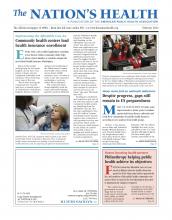Hepatitis A linked to communion
Members who received communion at a handful of churches in North Dakota may have been exposed to hepatitis A, according to the North Dakota Department of Health.
In late October, health officials released a list of five churches where residents may have been exposed to the virus, which is most likely spread when people do not thoroughly wash their hands after using the restroom or after handling soiled sheets and diapers.
“The risk of getting hepatitis A in this situation is low, but the department of health felt it was important for people to know about the possible exposure,” said Molly Howell, MPH, the state department of health’s Immunization Program manager.
Merging with Medicaid not a loss for public health funding
State public health departments do not necessarily lose funding when merged with larger Medicaid programs, a recent study found.
Published online in October in the Journal of Public Health Management and Practice, the study looked at organizational change in state health departments from 1990 to 2009. Researchers found that health departments were consolidated with Medicaid programs in 27 states within the study period. When that merger happened, funding earmarked for the public health department remained unchanged.
“The concern has been that such mergers have led to public health departments receiving fewer economic resources,” said lead author Paul Lantz, PhD, of the George Washington University School of Public Health and Health Services. “We found no evidence in this study to support that widespread assumption.”
The study found that when public health departments merged with Medicaid programs, there was a 5 percent drop in funding for the Medicaid programs. While the study did not determine the reason for that drop in funding, Lantz said one reason could be that an effective public health agency might help save the Medicaid program money by preventing costly diseases or health problems.
More study is needed, Lantz said, into whether health department and Medicaid program mergers will result in a decrease in public health funding as the Affordable Care Act is implemented.
Program encourages research diversity
A program established by the Centers for Disease Control and Prevention has shown success at engaging underrepresented minority scientists to work in HIV/AIDS prevention and research, according to a study in the December issue of APHA’s American Journal of Public Health.
The Minority HIV/AIDS Research Initiative, also known as MARI, targets disparities in the HIV/AIDS research community and attempts to diversify the HIV workforce. The study notes that black researchers are significantly less likely to receive high-level grants for health-related research and development.
Researchers found that between 2003, when the program began, and 2013, the program has funded 27 scientist-leaders “using low-cost strategies to enhance the development of effective HIV prevention interventions.” Those scientists have produced more than 45 peer-reviewed articles and more than 60 presentations at national and international scientific meetings.
The authors note that increasing the number of racial and ethnic minority scientists will diversify the workforce and may increase the credibility of research findings, as well as create opportunities to increase the “portfolio of HIV prevention interventions for disproportionately affected communities.” (Page 2,207)
- Copyright The Nation’s Health, American Public Health Association









